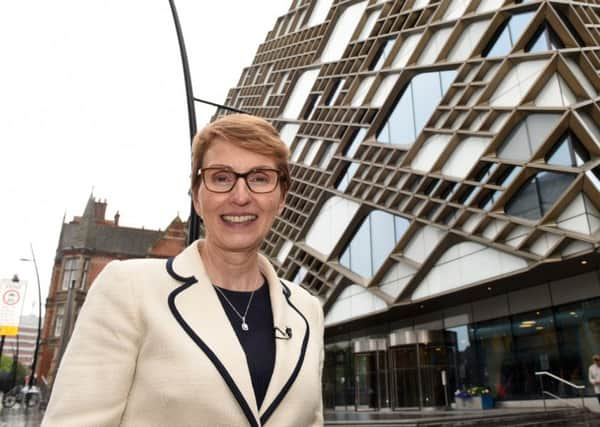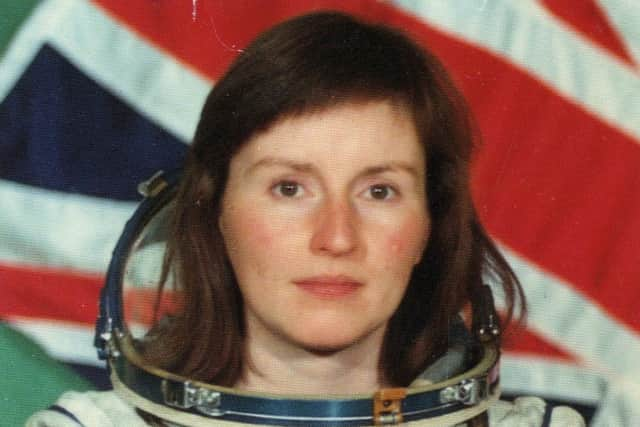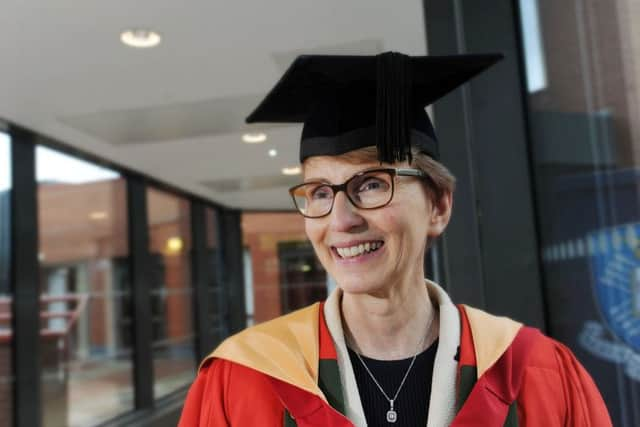Star Interview with Richard Blackledge: Sheffield astronaut Helen Sharman on her '˜perfect life' - and why she'd go to Mars


The path to a frothier sort of fame lay before her; TV presenting, perhaps, and a celebrity lifestyle. But another option was available too – a retreat from the public eye and the chance to reclaim some privacy.
Helen chose the latter and, today, has few regrets.


“There were people trying to make me do all sorts of things after my space flight,” says the former astronaut, who journeyed to the Russian station Mir for an eight-day mission in 1991, achieving national hero status at the age of 27.
Advertisement
Hide AdAdvertisement
Hide Ad“There were people who wanted to make huge amounts of money by creating a new celebrity, and while there are certain attractions to that, I knew there was an awfully big downside about having notoriety.
“Public memory is quite short, and I feel as though I’ve got a perfect life now. If I want I can go and talk to people about my space flight. But it does mean I can go into a café, or walk down a high street, and most people don’t know me.”
Dr Sharman OBE, now aged 54, has worked since 2015 as the operations manager of Imperial College London’s chemistry department.


“I do need to have a job now, because I need to pay the rent like everybody else does,” she reasons.
“Equally I love my job. And I love being part of a team.”
Advertisement
Hide AdAdvertisement
Hide AdSheffield still holds Helen, who grew up in Grenoside and went to Jordanthorpe Comprehensive, in the highest esteem. Signs are dotted around, from her star on the Walk of Fame outside the Town Hall to, more prosaically, the Sharman Court student flats on Broad Lane. On Thursday she made a rare visit back to her home city to collect an honorary degree and open Sheffield University’s £80 million engineering building, The Diamond.
It was something of a trip down memory lane, as she graduated with a BSc in chemistry from the institution in 1984. Last week students, all aspiring scientists, clamoured for autographs and photos - proof Helen’s accomplishments possess a huge cachet.


Wide-eyed and animated, she’s fond of making expressive gestures as she speaks – which she does quietly, with little discernible trace of a Yorkshire accent.
Also, if she’s bored of being asked for the millionth time what space was like, she’s deftly mastered the art of not showing it.
Advertisement
Hide AdAdvertisement
Hide AdSo, what has lingered longest in Helen’s mind about her week gazing down on Earth?
“It was such an intense time. The big thing is feeling weightless – it was so amazing, the most natural, relaxing feeling you can imagine. A bit like riding a bike, you can always remember what it’s like.


“I don’t tend to remember my dreams very often, when I go sleep, I zonk – I’m gone. But on the odd occasion I do sometimes have a dream where I’m floating along the space station and stop by a window and look out.
“The views were absolutely fabulous.”
Helen was one of five crew members on Mir – ‘You bond very closely’ – having won her place on the mission after responding to a radio advert that declared: “Astronaut wanted, no experience necessary.”
Advertisement
Hide AdAdvertisement
Hide AdThe promotion was for Project Juno, a programme to send a Briton into space. Helen had completed a PhD at Birkbeck University in London and was a research chemist for, appropriately, the confectioner Mars before she triumphed over 13,000 applicants.
Lengthy preparations were necessary – two candidates were picked to train at Star City, Moscow, and Helen was chosen after 18 months at the camp.
She readily admits she would ‘love to go back’ to space. Major Tim Peake, the second British astronaut who went to the International Space Station in 2015, let slip in January that he is set to return.
“I’d go to the ISS, absolutely. It would be quite fun to go to Mars, as well, although I would want to return. I don’t want to go on a one-way mission. There are so many things you can do in space that you just can’t do on the ground. It’s just an amazing place.”
Advertisement
Hide AdAdvertisement
Hide AdPeake is a European Space Agency employee, whereas Project Juno was strictly a one-off trip, she points out.
“I did apply to the ESA a couple of times after my mission, but that was when Britain wasn’t funding it, so really in retrospect it was a waste of time. Maybe I should consider applying again. But I don’t want to boot Tim out of a job at the moment.”
Helen says she is ‘ambivalent’ about the future of science in the UK.
“We’ve got some brilliant minds here, so in some respects we’ve got an amazing skills base. But clearly I’m aware of international politics. And then there’s the question of where the science funding comes from to do a lot of our research.
Advertisement
Hide AdAdvertisement
Hide Ad“There’s a big concern about what happens with Brexit. We used to get more money back from Europe than we ever put in, so I don’t understand how the Government can really make that up.”
And she’s cautious about saying whether some of the money earmarked for schemes such as HS2 - projected to cost £55.7bn – could be better spent on another voyage to the stars.
“Going into space is the right thing to do, but not the only thing. Of course we need hospitals, research and education. The trouble with money is it’s finite, everybody’s got something they think it’s better to be spent on.”
Helen doesn’t come to Sheffield often these days, but family members still live nearby and the Institute of Science and Technology, which she is president of, is based at the university.
“As time goes by I think I’ll spend more time here.”
‘First person on Mars is already at school’
Advertisement
Hide AdAdvertisement
Hide AdAs a member of the elite Association of Space Explorers, Helen Sharman predicts an exciting future for extraterrestrial travel.
“We really do believe the first person to walk on Mars is already at school, so it’s going to happen in the next 20 years or something like that – there’s no doubt in any astronaut’s mind,” she says.
“We’ve got a few problems to sort first – radiation and food being two big ones - but it’s going to happen.”
Additionally, the commercialisation of human space flight is approaching in earnest, Helen thinks.
Advertisement
Hide AdAdvertisement
Hide Ad“It’s coming. China’s pushing hard for a space station and they’ll go to the moon, so I think there’ll be a political competition as well.
“I think it’s imperative for the human race to pursue, to push boundaries, and we always have done. If we don’t, we will start to die from always being too inward-looking.”